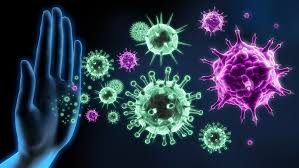
The Wei Qi 衛氣 or Protective Qi concept in Chinese Medicine is likened to our immune function. It is an energy that circulates in the periphery of the body during the day, guarding us from attack by harmful microorganisms, chemicals, environmental and climatic influences. At night, Protective Qi circulates deeper within the organs of the body, overseeing the repair of damaged cells and tissues.
When our Protective Qi is strong, external pathogens such as viruses and bacteria are warded off our body just like water off a duck’s back, and we can easily adapt to extreme weather changes. If our Protective Qi is weak, these external factors can easily penetrate our body’s defences, resulting in illness.
How can we strengthen our Protective Qi?: According to Traditional Chinese Medicine (TCM), Protective Qi is derived from the essences of food and inhaled air. Its ability to respond also depends on environmental influences, our level of activity, quality of rest, emotional and mental health. Let’s talk about each one of these factors in more detail below and some tips on how to strengthen our Protective Qi.
DIETARY INFLUENCES
Malnutrition diminishes the ability of our Protective Qi to respond and contributes to the risk of developing illnesses. It is not only seen in starving third world children – poor nutrition is commonly found in people of well-developed countries who consume too much food which is of none, or minimal, nutritional value. Therefore, a balanced diet based on wholefoods is critical for a strong Protective Qi. This very much aligns with modern nutrition which believes that a well functioning immune system correlates with an optimum nutritional status that depends on the adequate intake of a wide variety of nutrients and phytochemicals.
Foods and eating habits that stress the immune system: artificial sweeteners, refined sugars, high saturated fatty foods (red meat, pork, dairy), packaged and processed foods (chips, bacon, ham, sausages, salami), fried foods, excess salt, polyunsaturated cooking oils, hydrogenated vegetable oils (shortenings, margarine), alcohol and fizzy drinks.
It is important to reduce the intake of these foods, avoid overeating and eating late at night. It is also recommended to eat at regular times and consume foods and drinks at a temperature no more or less than 8 degrees of our body temperature, that is to consume between 29 and 45 degrees. As consuming foods at extreme temperatures can weaken and stagnate our Qi.
A wholefoods diet that enhances immune function: includes plenty of fruits, vegetables, whole grains, legumes, nuts and seeds. A study that involved six countries revealed that plant-based or pescatarian diets were associated with lower odds of moderate-to-severe COVID-19, which seem to be protective against severe COVID-191.
The foods listed below help keep our mucus membrane healthy and our immune function strong. Try to consume foods from each of the following categories regularly (organic wherever possible) to ensure a well balanced diet:
- Cruciferous vegetables – broccoli, kale, bok choy, brussel sprouts, cabbage, cauliflower
- Other vegetables – carrots, sweet potato, pumpkin, radish, turnip, beetroot, red capsicum, avocado, sprouts, spinach and other green vegetables
- Whole grains – oats, quinoa, brown rice, wheat bran, wheat germ, barley, millet
- Legumes – lentils, chickpeas, peas, kidney beans, black beans, adzuki beans, tempeh
- Nuts and seeds – flaxseed, chia seed, sunflower seed, brazil nuts, walnuts, almonds, pinenuts
- Mushrooms – shiitake, reishi, white button, wood ear, snow fungus
- Fruits – apple, pear, papaya, blueberries, blackberries, raspberries, lemon, lime, grapefruit, red grapes, nectarines, apricots, dried fruits
- Herbs and spices – turmeric, ginger, parsley, cardamom, fennel, fenugreek
- Sea vegetables – Seaweeds eg. wakame, kelp (avoid if have diarrhea )
- Cultured vegetables – raw saltless sauerkraut, kimchi
It is also important to ensure that you are sufficiently hydrated by drinking 2-3L of water a day. Eating less (70% full) or even intermittent fasting allows digestion to be more efficient resulting in stronger Qi than if an excess is eaten. And for those who tend to feel cold easily, or with weak constitutions, it is best to cook the vegetables and reduce the consumption of raw salads and fruits.
AIR THAT WE BREATHE
Another key aspect of Protective Qi is that it is also derived from inhaled air. In fact, the character Qi 氣 in Chinese Medicine literally translates to air or breath. We all know that if we stopped breathing for a few minutes our lives would end. Oxygen is required in every part of our bodies and is one of the most essential nutrients. It helps to produce energy, eliminate wastes, destroy harmful microorganisms, is required for vitamin C utilisation, and more!
As you can see, our ability to obtain and utilise oxygen well is vital for a healthy functioning immune system. However, in modern society where many of us live and work in a box, so to speak, the recycled air that we breathe is without doubt of poor quality. Not to mention mask wearing to make things worse! When our body lacks oxygen, we can experience lethargy, heaviness in the body, poor quality sleep, low mood etc. Such chronic oxygen starvation can be detrimental to our cells and tissues in the long run.
When was the last time you took a walk among trees, the powerhouse of oxygen production?
Apart from the dietary practices mentioned earlier, taking a walk daily, regular moderate exercise, taichi, meditation, Yogic and Qi Gong breathing exercises can all help to increase and distribute oxygen in the body. Find a practice that suits you and stick to it. Consistency is key.
ENVIRONMENTAL INFLUENCES
In addition to clean fresh air, sunlight and pure water help strengthen our Protective Qi. Try to get at least 10-20 mins of direct morning sunshine daily to ensure adequate Vitamin D levels. Make sure you have a good water filter and air purifier (if required). Indoor plants such as snake plant, peace lily, English ivy and areca palm are excellent natural indoor air purifiers. Minimise exposure to radiation such as positive ions from electronic screens wherever possible.
ACTIVITY AND REST
Both physical overwork and lack of activity can weaken our Protective Qi. Too much activity (including sexual activity) depletes the body from vital energy whilst a sedentary lifestyle impairs circulation. Similarly, lack of or poor quality sleep can result in decreased resistance to disease and adaptability to the environment. Therefore, it is important that we keep a regular sleep-wake schedule, refrain from physical overstrain and regularly exercise.
EMOTIONAL AND MENTAL HEALTH
It is very important to stay connected with a supportive network of friends and be a part of a community to maintain a healthy emotional and mental state. It is mentioned in the Huang Di Nei Jing (Yellow Emperor’s Inner Classics) how different emotions can affect different organs of the body. For example, mental exhaustion from overthinking and worrying can impair the TCM spleen-pancreas function and result in poor nutrient absorption. Similarly, too much anger, grief and fear can impair our internal organ function and health.
Holding onto old resentments can obstruct the flow of Qi in our bodies which weakens our immune system. Practicing mindfulness, gratitude and selflessness can help us to let go and remedy our old wounds. The Inner Classics says that those who are brave can overcome disease, while those who are fearful tend to fall ill. Volunteer wholeheartedly for a cause that matters to you, and you’ll be surprised how much more vibrant and younger you’ll feel!
All the best towards your journey to build a stronger immunity. You deserve to shine with great health and happiness!
Author Dr Rachel Woo (TCM), Morningside Acupuncture & Natural Therapies Healing Sanctuary
14/01/2022
1 Kim H, Rebholz CM, Hegde S, et al. Plant-based diets, pescatarian diets and COVID-19 severity: a population-based case–control study in six countries. BMJ Nutrition, Prevention & Health 2021;4:doi: 10.1136/bmjnph-2021-000272

